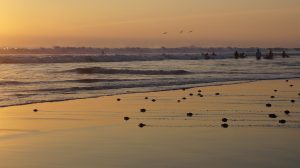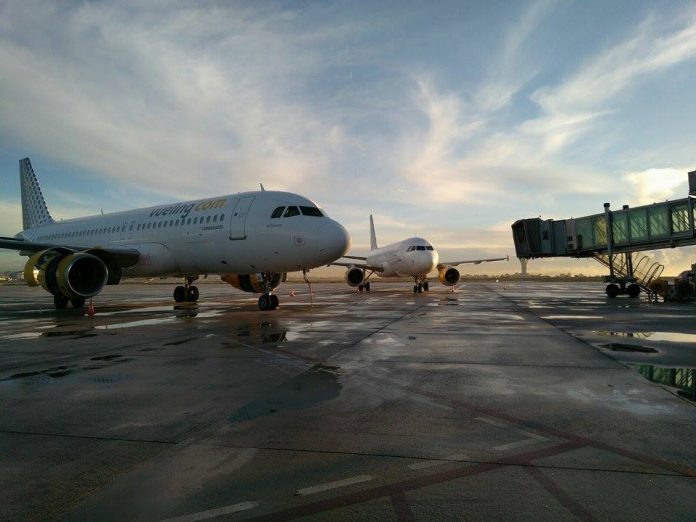But, in my case, I really am racing against the clock. I have to endure a marathon that’s more exhausting than the Ironman. Barcelona to Copenhagen, Copenhagen to Las Vegas, Las Vegas to Vancouver. Skyscanner decided that it was $390 cheaper to take flights that go in opposite directions, if for no other reason than to sadistically stretch out my suffering. Twenty-five hours of travel time — more than a day — doing completely random and useless layovers to arrive at my final destination. The second flight is delayed, so I can only pray the third flight is held back as well so I don´t miss it. I’m lucky; the third flight is postponed. This isn’t especially surprising since I’m flying with budget airlines, but I finally arrive in Vancouver! The air is fresh and the transit system seems convenient, but I opt for a taxi; I’m exhausted. I shuck my bag into the trunk, slide into the backseat, and close my eyes. I finished the relay, barely. I wasn’t the only student undergoing a travel marathon in search of something new and exciting that week.
During those same early days of January, UFV student of Spanish and Mexican history Natasha Berg faced a similar challenge: three flights, plastic food, no sleep, and an airport night of janitors and fluorescent-light buzz. The good news is that she didn’t have any major delays. Natasha arrived at the Querétaro airport in México with her friend and fellow UFV student Cassy, and they both took a bus into the city. Querétaro was very different from Abbotsford; a vibrant landscape of cobblestone and sweeping archways would be her home for the coming months. This new home was not only comprised of bustling streets and dazzling views, but also of the people she would meet and be sharing her life with. The friends Natasha made are one of the best parts of her experience in México.
“I’ve learned about the different ways people live here and the values that they hold. I’ve learned that students from all over the world have more in common than I imagined,” exclaimed Natasha. “There are a lot of people from so many different countries here. The world seems a lot smaller to me now.”
In addition to studying at Tecnológico de Monterrey in Querétaro, Natasha is doing a part-time internship at an art museum, which enriches her professional career. Studying abroad challenges your perspective and it broadens your horizons at a personal and professional level. According to The Huffington Post’s Kayla Mathews, students that have been abroad are more likely to find a job, to hold jobs of greater responsibility, and to be more creative than students who get a degree solely from their country of origin. Mathews also reports that 97 per cent of students who study abroad find a job within 12 months of graduation, while only 47 per cent of students who haven’t studied abroad find a job within the same time period. Abandoning your comfort zone forces you to adapt and be more versatile in different work environments.
For both me and Natasha, going from the places we started from, our familiar home, to the foreign country we wanted to see necessitated a full 180 degree turn. Natasha lives in the university dorms in a convenient area close to supermarkets and restaurants in Querétaro. The city is located in central Mexico, about 200 km northwest of Mexico City. Compared to Abbotsford, it is quite large (population of over 1.2 million including the metro area) and much more urban. The historic centre is a UNESCO World Heritage Site and is very beautiful, with its old colonial streets and European-style architecture. The rest of Querétaro is very modern and metropolitan, with several shopping malls, highways, and sleek buildings. “I’ve had the chance to see places I never thought I would see,” Natasha said, smiling. “This is definitely different than the typical university experience, but I feel fortunate to be here and I’m glad that I chose this university.”
While speaking with me, Natasha recalled an amazing trip to Ixtapa-Zihuatanejo, a beach town on Mexico’s southwest coast. It was a long bus ride, but necessary to escape the city and relax in the sun, to feel the warm sand for a weekend. She swam in the waves, snorkeled with tropical fish, ate exotic food, and released baby sea turtles into the ocean. This all sounds enchanting, and is a stark contrast from my experience.

In the dorms of Baker House, I sometimes feel like I’m in the middle of nowhere, with raindrops tainting my windows. I have never seen so much rain in my entire life. Also, I’ve never been so far away from everything, even a cheap meal or walkable streets. In Barcelona, the nights never die; sparkling lights paint the streets and you could get a kebab at four in the morning if you felt like it. Now, I need to convince someone to drive me to Walmart to get groceries, or to I take the bus. But it’s not all bad. The air doesn’t smell muggy and the city doesn’t look grey from the pollution. British Columbia takes my breath away each time I discover another cascading waterfall, or when I’m simply breathless from going on another majestic hike.
In my university, Universitat Autonòma de Barcelona, I attended classes with over 100 other students. Here at UFV I have 20 classmates and all the teachers know my name. Most of my classes in Barcelona entailed listening to a teacher recite a PowerPoint and then taking a theoretical exam at the end, only to forget everything the next day. At UFV, we do personalized workshops and local writers and publishers come to share their experiences with students; I am writing a film and I am doing a volunteering program with children to promote their rights through literature. It feels like my fellow students and instructors are genuinely invested in my success.
At Baker House, I am five meters away from the common room in the dorms, where I share dinners, laughs, and good times with people from all over the world. But they aren’t simply people anymore, now I have the honour of calling them my close friends. My home is not only in Barcelona anymore, but divided between two cities 8587.46 kilometers away from each other. I hope that a part of me will stay in Abbotsford, carried in the hearts of everyone I have been lucky to befriend, in the same way that a part of them will stay with me forever. Like Natasha, the world feels smaller to me now.
You might be wondering if everything would go so well for you if you decided to study abroad. I don’t have an answer for you. I can tell you that most, if not all of the people I have met on exchange have had positive experiences, but there are always exceptions and every person is unique. Traveling is not a blissful leap into a pink bubble with guaranteed fun. Sometimes you get lonely, especially for those who live in flats, because it’s harder to meet people. You’ll be far from home, not only in kilometres but also in feeling a loss of connectedness. In Barcelona the timezone is nine hours later than in Abbotsford, so if I need to talk to someone from there I usually have to wait for brief overlaps in workable hours. The language barrier can also be problematic when studying, especially at the beginning.
Life is a rollercoaster, especially when you decide to get out of your comfort zone, and nothing is more outlandish and wild than travel. This rollercoaster ride implies that there will be experiences that sometimes take an unexpected turn and low points that make you feel a little uneasy, but there are also those peak moments, the ones that become an inerasable landscape in your memory that you can recall and retread through your mind for the rest of your days. My experience in Canada has been one of those times.
I must admit that I ended up in Abbotsford by chance. I knew that I wanted to go to Canada and study creative writing. I did the exchange application the day before the deadline, so I didn’t pay much attention to which city I applied for. When I discovered that my exchange had been approved and that I was going to Canada, I celebrated; but then the euphoria was replaced with concern. Where is this city, anyways? I wrote down “Abbotsford” in Google and was shocked by the definition in urban dictionary: “A city in British Columbia, Canada, where everything is boring and everybody wants to go to another town to do stuff.” This definition was reinforced by some newspapers, explaining that Abbotsford was named as one of the most boring cities in Canada. After a mini crisis, and a spat of cursing myself for not having checked Google before applying, I tried not to panic. I told myself that “it’s not about the place. It’s about the people.” I didn’t realize how prophetic I was being; this has ironically been some of the funnest months of my life in one of the supposed most boring cities.
I was supposed to go back to Barcelona in May. Today, I applied to stay as an international student at UFV next fall.


